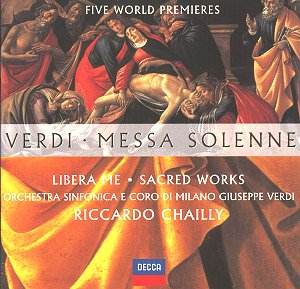Giuseppe VERDI (1813-1901)
Messa solenne (Messa di Gloria). Qui tollis. Tantum ergo in F. Laudate
pueri. Tantum ergo in G. Pater noster. Ave Maria. Libera me (Messa per Rossini,
1869 version).
 Elisabetta Scano, Cristina
Gallardo-Domâs (sopranos); Juan Diego Flórez, Kenneth Tarver
(tenors); Eldar Aliev, Michele Pertusi (basses); Orchestra Sinfonica e Coro
di Milano Giuseppe Verdi/Riccardo
Chailly.
Elisabetta Scano, Cristina
Gallardo-Domâs (sopranos); Juan Diego Flórez, Kenneth Tarver
(tenors); Eldar Aliev, Michele Pertusi (basses); Orchestra Sinfonica e Coro
di Milano Giuseppe Verdi/Riccardo
Chailly.
 Decca 467 280-2 [DDD]
[69'09]
Decca 467 280-2 [DDD]
[69'09]
Crotchet
£10.99
Amazon
UK
£12.99 AmazonUS
$15.49

The Verdi celebrations have elicited a host of welcome issues from the majors,
including the eye-opening Jérusalem on Philips (462 6132-2).
Riccardo Chailly here makes a notable contribution by turning his attention
to another side of this most operatically based of composers: the lesser-known
liturgical music. Decca in fact include no fewer than five World Première
recordings on this release (the first five items listed above, all in critical
editions by Professor Dino Rizzi).
Of all the pieces on this disc the most familiar is the Libera me,
later used (with an expanded solo part) in the awe-inspiring Requiem
of 1874. Chailly presents the 1869 version (intended for the multi-composer
Messa per Rossini). Aided by the dramatic declamation of the soprano
Cristina Gallardo-Domâs, the Libera me emerges as a dramatic
scena of grand design. Its effect is highlighted by the excellence
of Decca's recording (Andrew Cornall, Producer and Philip Siney, engineer),
which unflinchingly presents the wide dynamic range in a believable acoustic
space.
All of the last three items on the disc (the Libera me, the Pater
noster and the Ave Maria) are of a consistently high musical standard,
the choir excelling in the unaccompanied Pater noster. If you start
by playing the Libera me and then turn back to the Missa solenne,
you may be in for a shock. The latter has a light, crisp chamber music feel
to it: Chailly inspires his strings to appropriately gossamer-light articulation
in Cum sancto spiritus. One might argue that the Gloria in
excelsis is civil rather than grandly celebrational, but as long as one
does not expect the grand gestures of late Verdi, this torso will delight
(the manuscripts of Qui sedes and Quoniam tu solus sanctus
are unfortunately lost). Particularly noteworthy is Elisabetta Scano's clear
solos and the deft woodwind contributions.
The smaller items (each lasting in the region of five minutes) provide their
own delights. The Qui tollis, in particular, with its playful solo
flute, will provide much pleasure. The more harmonically experimental Ave
Maria (first performed in 1880) receives a touching performance: the
orchestra is extremely tender, as is the soloist, Cristina Gallardo-Domâs.
A fascinating disc, then, and one in which the dedication of all concerned
is beyond doubt. Well worth exploring.
Colin Clarke
Performance

Recording


